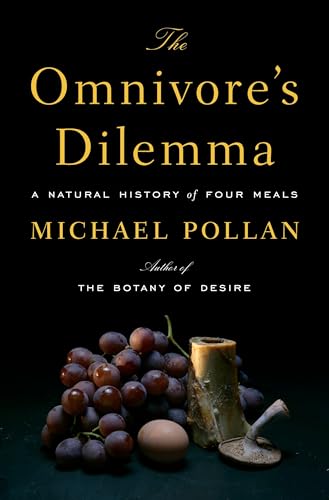Mooallem parses the current craze in Popular Meat Writing, and its sources in what he calls "digestive dissonance." He can obviously turn a mean phrase, but this particular case is something we all struggle with, I think. Our economy has produced an unprecedented supply of affordable, appealing food, which should be a blessing to the world's famished multitudes. Instead, it seems only to crush those multitudes into even more poverty, suffering, and oppression. And those of us who are comparatively fortunate are morally implicated with every bite.
 In addition to Fast Food Nation, Mooallem reviews Modern Meat by Oliver Schell; Portrait of a Burger as a Young Calf by Peter Lovenheim; The Jungle by Upton Sinclair; and "Power Steer" by Michael Pollan. That article appeared in 2002 in the Times, and Pollan has more recently published his own tome devoted to the subject, The Omnivore's Dilemma. I just got a copy to take along to Charleston and read while playing at the Spoleto Festival USA.
In addition to Fast Food Nation, Mooallem reviews Modern Meat by Oliver Schell; Portrait of a Burger as a Young Calf by Peter Lovenheim; The Jungle by Upton Sinclair; and "Power Steer" by Michael Pollan. That article appeared in 2002 in the Times, and Pollan has more recently published his own tome devoted to the subject, The Omnivore's Dilemma. I just got a copy to take along to Charleston and read while playing at the Spoleto Festival USA.As an eager (and proselytizing) consumer of Popular Meat Writing, I'm ashamed to admit I remain an omnivore. As Mooallem notes, "[w]hen it comes to reconciling digestive dissonance, it seems there is simply no overestimating the moral authority of the stomach." I'm determined to convert to a more ethically defensible way of eating though, even if it means missing out on a lot of delicious Southern cooking.
Here's how Mooallem closes his piece in The Believer:
Popular Meat Writing is about making connections, tying the ubiquitous to the sensational, restoring a place and face to the rootless and indistinct. It puts our Christmas ham back in a cramped pen at Smithfield and plops the Iraq War squarely on our plates. Horrifying as these connections may be, they’re also reassuring. For the details may foster in us, as they did in Whitman, self-awareness—a greater sensitivity to our responsibilities, whether we can ultimately live up to them or not. After all, Meat Writing ties us to something, and no one likes to dine alone.
Thanks to The Believer, a fantastic literary magazine, for making the full text available online - you can read it here!


 Technorati Link Count: no. of blog reactions to this post
Technorati Link Count: no. of blog reactions to this post
No comments:
Post a Comment